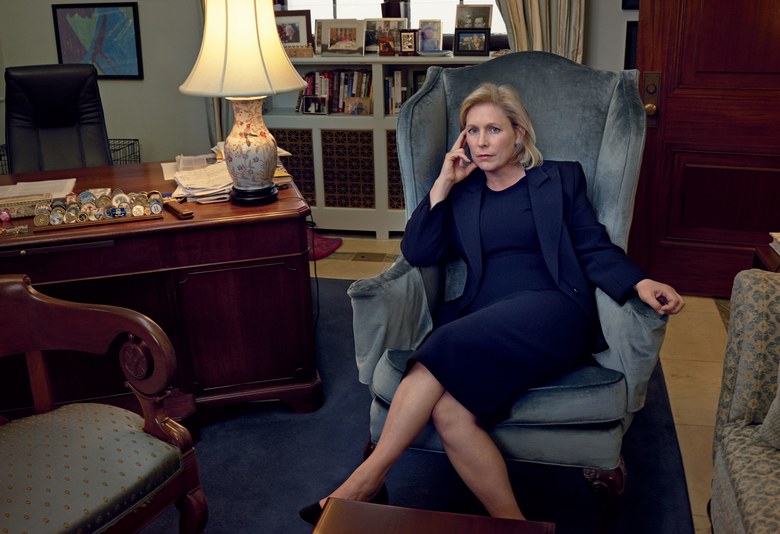Will NY Sen. Kirstin Gillibrand Succeed Where Hillary Failed? Vogue US Makes A Strong Case For Hope
/NY Senator Kirsten Gillebrand photographed by Annie Leibovitz, Vogue, November 2017
Watching Bernie or bust progressives trying to malign the reputation of New York Senator Kirsten Gillibrand is a distressing experience, in the aftermath of Hillary Clinton's defeat in the 2016 presidential campaign. To me, Gillibrand's record is sound as a progressive, even if she does hail from Troy, New York and a more conservative zone in the liberal state.
Gillibrand says 'calm down', that she has been recognized more in the last six months than in the entire eight years since being appointed to fill Hillary Clinton's New York State Senate seat. "I'm not sure what it is," the mother of two boys tells Jonathan Van Meter in her Vogue November 2017 interview. "Maybe it's just seeped in more."
It's easy enough to jump to Gillibrand's 2017 record of voting against Trump's Cabinet appointees more often than any other senator and her vocal condemnation of his record on Charlottesville and his transgender military ban. Note that Gillibrand sits on the powerful Armed Services committee and has been an outspoken advocate against sexual violence in the military.
What gets my attention are Van Meter's observations over several days is Republican women coming up to Gillibrand. This is not a surprise, with the senator's home district being two to one Republican.
But it is not just Democrats. Over the next couple of days I see others approach her and say some version of “I am Republican, and I really appreciate what you’re doing in Washington.” Even this afternoon, the day after Trump threatened North Korea from his golf club in New Jersey and scared the bejesus out of everyone with his “fire and fury like the world has never seen” voodoo, a frail, elderly Republican lady comes up to Gillibrand looking like she has seen a ghost. She wishes the senator “luck” in dealing with Trump and tells her she was “up all night” because of his press conference from Bedminster. As she walks away, Gillibrand shakes her head and mumbles almost to herself, “Oh, my God, everyone’s worried about North Korea. It’s not . . . it’s not good.”
California Senator Kamala Harris is said to be eyeing 2020, as is Gillibrand. Harris has attracted major applause for her tough-talking approach in senate hearings for Trump's cabinet nominees. Gillibrand comes across in the same way in Vogue's November 2017 profile.
Gillibrand left her first major mark in the Senate as a leading voice on the repeal of DADT (Don't Ask Don't Tell ban on gays in the military).
DADT was the first time Gillibrand’s colleagues began to realize how tough she can be. “She will go right up to anybody on the floor,” says New Jersey Senator Cory Booker, also eying a run in 2020, “and just get in their face until they say yes in a way that sometimes makes me feel uncomfortable. She is singular in that way. She fights and fights and fights.”
Seasoned women in politics writer Rebecca Traister has profiled both Gillibrand and Clinton multiple times. Traister believes that being 20 years younger than Hillary and not coming with her baggage is a crucial difference between the two women. “Gillibrand understands that she is capable of presenting herself as feminine and maternal in a way that Hillary could never have done and still been taken seriously in politics. Women of Hillary’s generation were expected to excel in male worlds by conforming to male norms.” Gillibrand, who was born in 1966, followed a far more liberated path.
“Gillibrand understands that she is capable of presenting herself as feminine and maternal in a way that Hillary could never have done and still been taken seriously in politics. Women of Hillary’s generation were expected to excel in male worlds by conforming to male norms.” Gillibrand, who was born in 1966, followed a far more liberated path.
In this wide-arch interview and Kirstin Gillibrand, the senator is quoted speaking to a crowd gathered to hear her speak at the Johnstown Historical Society and Museum, in Elizabeth Cady Stanton's hometown. Her words make an impression on this writer, who believes in her heart that the third-wave moment of feminism really never happened. If it did, the third wave movement was weak and lost ground every step of the way to social conservatives determined to make America a theocracy.
At a dais set up in the grass with a small white awning pitched over it for shade, Gillibrand gives a short but surprisingly moving speech, one that feels like the bare bones of a stump speech. She talks about why national paid family leave matters, because without it the “workforce is stuck in the Mad Men era. I have a great bill that makes it affordable. Two dollars a day.” She pushes affordable day care and health care, and then she gets to the one thing that clearly matters to her the most: more women running for office. “Just imagine what it would be like if we had 50 percent of women in Congress? Imagine if we had a woman president.” A mordant chuckle ripples through the crowd, still smarting from Hillary’s excruciating loss. “Things would change, I promise you. There would be different issues raised, different solutions offered. And we wouldn’t still be fighting for access to contraception; we wouldn’t still be fighting for equal pay for equal work. These things would be done, foregone conclusions. Our economies and communities are suffering because we don’t have enough diversity in Congress. I think there is an urgency to this. But I’m very hopeful. Something’s changing. Frankly, we are the suffragists of our generation.”





















































